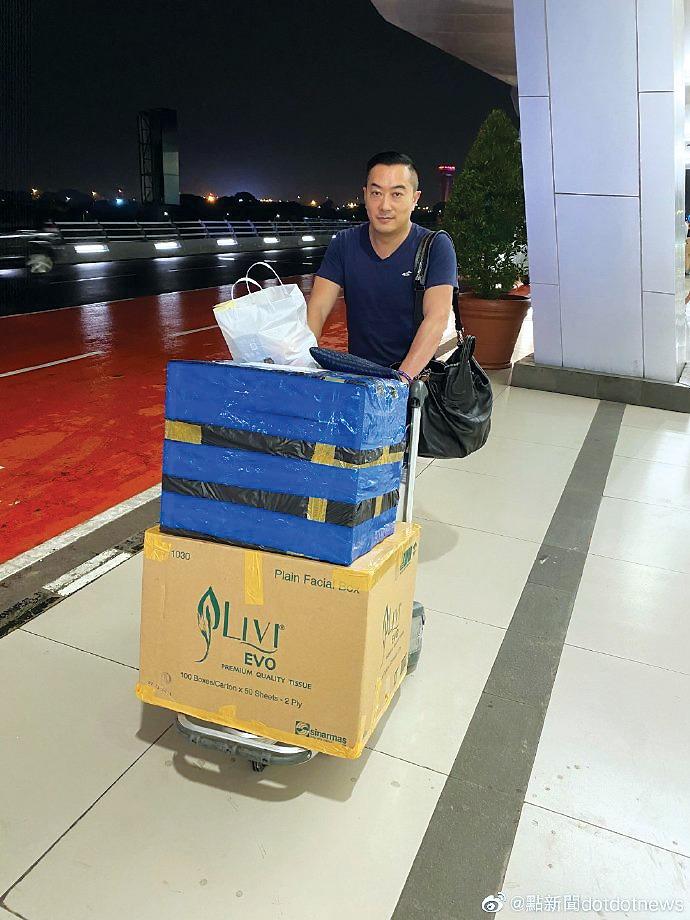 Hong Kong police officer Chan Hoi-kong prepares boxes of face masks to be donated to medical workers in Hubei province, the epicenter of the coronavirus outbreak. (PHOTO PROVIDED TO CHINA DAILY)
Hong Kong police officer Chan Hoi-kong prepares boxes of face masks to be donated to medical workers in Hubei province, the epicenter of the coronavirus outbreak. (PHOTO PROVIDED TO CHINA DAILY)
To support the nationwide battle against the novel coronavirus, a Hong Kong police officer donated about 20,520 face masks among other medical supplies to hospitals in Hubei province, the epicenter of the outbreak.
Chan Hoi-kong, a superintendent in Sha Tin district, said it was his way of thanking mainland people for their trust and support of Hong Kong police during months of social unrest last year.
“Mainland compatriots embraced our Hong Kong police. In return, we must hold them even closer when they are in need,” he said.
Chan was one of the front-line police officers who had to deal with the riots head-on. Amid violent attacks by radicals and distrust of some local people, the support from across the boundary gave him uplift.
After he opened an account on Weibo, a social platform popular on the mainland, in September, many mainland netizens left him messages of encouragement and support.
In November, his police station received cans of Pepsi cola from the mainland, which were designed with slogans of support, such as “Police are our heroes.” It was then he decided to do something in return for their encouragement.
Then came December, when the coronavirus broke out in Wuhan, Hubei province, and spread across the country. By the end of January, nearly 10,000 people on the mainland had been infected. More than 200 had died.
The supply of protective gear was critically short, especially face masks, for front-line medical workers in Hubei. Some employees had to make their own masks and protective clothing.
On Jan 31, his birthday, Chan made up his mind to contribute to the nationwide fight against the virus. He asked his friends to buy face masks from South Korea, and donated 520 of them to the First People’s Hospital of Jiangxia, Wuhan, on Feb 6.
Chan’s birthday wish became a reality, but it caused a firestorm in Hong Kong. When mailing the package, Chan’s friend had written on it, “Donated by Hong Kong police”. A controversy arose as Chan found himself suddenly accused of donating vital police resources to the mainland without authorization.
There were dozens of cases of the coronavirus in Hong Kong, and people were lining up for blocks just to buy a limited number of face masks.
Chan had never thought of “favoring” the mainland, he said, but wanted only to express his gratitude.
Later, he and his friends donated about 6,000 face masks to medical workers at Hong Kong hospitals. These masks were also purchased from South Korea by his friends.
Meanwhile, the abuse kept sweeping social media. Chan’s personal information and that of his family, including his two children, were leaked online. Some troublemakers even went to his door and took photos.
The furor caught the police’s attention. Chan was put on unpaid leave while an investigation was carried out.
Chan stayed calm, though admitting he has been disappointed by the outcome. He is certain that he will be cleared of any allegation of wrongdoing.
Chan’s plight came to the notice of people on the mainland, who gave him moral support. Encouraged, he decided to buy more face masks to support the anti-virus campaign.
By then, it was mid-February. Overseas purchase of face masks became rather difficult following the virus outbreaks in South Korea and Japan. After a friend told him Indonesia had stockpiles, Chan flew to Jakarta.
Chan’s friend runs a clinic in Indonesia with his wife, and has connections with local suppliers. The couple put Chan in touch with suppliers. But that didn’t solve the problems.
Indonesia had reported no coronavirus cases before March 2, but cases soared in neighboring countries, which created a large demand for Indonesian face masks and scarce supplies. The inventories of large companies were sold out. Chan and his friends had to drive to remote suburbs to check out small drugstores.
In the midst of the shortage, all trade in face masks demanded cash payments. Chan was making regular trip to the bank, withdrawing from his account and exchanging for the local currency. In additon, it also rained every day, creating a risk that the face masks would become wet and therefore ruined.
Despite the hardships, Chan still rounded up 35,000 face masks during one week in Indonesia. They cost him about HK$130,000 (US$16,700), or nearly four months of his pay.
Besides the 20,000 donated to Hubei hospitals, the rest were given to Hong Kong hospitals and the city’s police officers who were also working on the front line against the disease.
Chan doesn’t think it was a great accomplishment. He just did what his conscience told him to do, and it was just within his capability.
“Our (Hong Kong and mainland people’s ) hearts link together. I think what the country needs now is only two things — unity and support,” Chan said.


